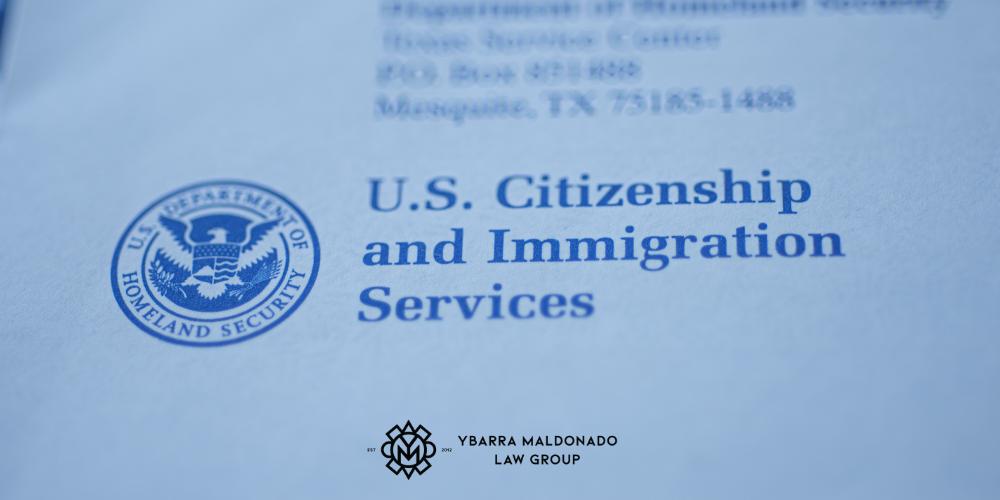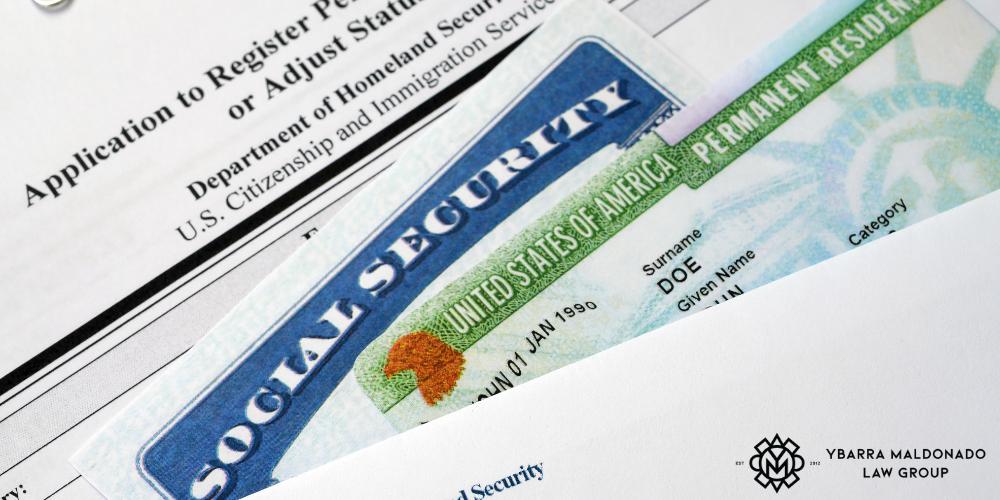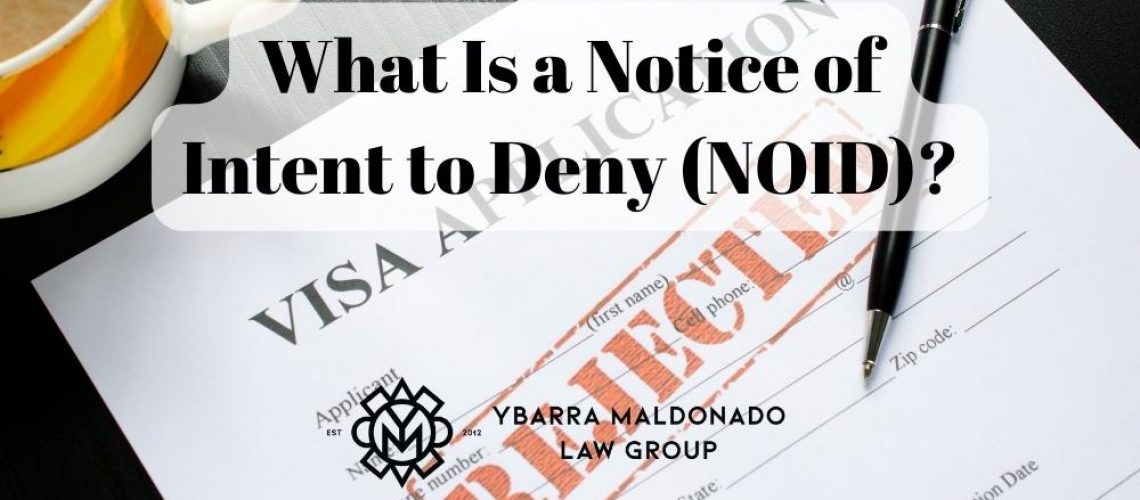Coping with the complexities of the U.S. immigration system can be a daunting experience. Receiving a Notice of Intent to Deny (NOID) from USCIS can add significant stress to an already challenging process. As an immigration law firm with years of experience navigating the intricate landscape of immigration law, we understand the apprehension and uncertainty that accompanies such a notice. If you are facing a NOID from USCIS, contact the skilled immigration team at Ybarra Maldonado Law Group. Schedule a case evaluation by calling 602-910-4040 today.
What Is a USCIS Notice of Intent to Deny (NOID) in Immigration Law?
A USCIS Notice of Intent to Deny (NOID) is a formal communication issued by the United States Citizenship and Immigration Services (USCIS) to notify an applicant that their immigration petition is facing potential denial. When a USCIS officer reviewing an application finds that there is insufficient evidence, discrepancies, or other issues that could lead to a denial, they issue a NOID to allow the applicant an opportunity to respond before a final decision is made.
What Does “Intent to Deny” Mean from USCIS?

“Intent to Deny” from the United States Citizenship and Immigration Services (USCIS) signifies that, upon reviewing an immigration application or petition, the USCIS officer has identified issues or concerns that could lead to the denial of the application. It’s a formal notice issued by USCIS to inform the applicant or petitioner that, based on the information available or provided, there are reasons why the application may not be approved.
When USCIS issues a Notice of Intent to Deny (NOID), they outline specific reasons or deficiencies in the application, such as insufficient evidence, discrepancies, or failure to meet certain legal requirements or criteria. The purpose of issuing a NOID is to provide the applicant or petitioner with an opportunity to address the identified issues by submitting additional evidence, clarification, or arguments to overcome the grounds for denial.
Receiving a Notice of Intent to Deny doesn’t mean the application has been denied yet. Instead, it serves as a warning or notification to the applicant or petitioner that their application is at risk of denial unless the identified issues are resolved or adequately addressed within a specified timeframe. Responding to the NOID is crucial, as failing to provide a satisfactory response within the given timeframe may lead to the application being denied by USCIS.
Notice of Intent to Deny (NOID) vs. Request for Evidence (RFE)
A Notice of Intent to Deny (NOID) and a Request for Evidence (RFE) are both official communications from the USCIS. They both relate to an immigration application or petition, but they serve different purposes.
Request for Evidence (RFE)
USCIS issues an RFE when the reviewing officer determines that certain documents, information, or evidence essential to the application are missing, incomplete, or insufficient. The purpose of an RFE is to request the applicant or petitioner to provide additional evidence or clarification on specific aspects of their application.
An RFE typically outlines the particular items that need to be submitted or clarified to complete the application file. Responding to an RFE involves providing the requested evidence or information within the specified timeframe (usually around 87 days).
Notice of Intent to Deny (NOID)
A denial notice is issued when the USCIS officer reviewing the application has identified substantive issues or concerns that could lead to the denial of the application. Unlike an RFE, a NOID typically signifies more serious issues that might go beyond just missing or incomplete documentation. It may involve discrepancies in the evidence provided, failure to meet legal requirements, or other fundamental concerns that could lead to denial.
A NOID outlines specific reasons for potential denial and provides an opportunity for the applicant or petitioner to address these concerns before a final decision is made. Responding to a NOID involves providing a comprehensive response addressing the issues raised within the specified timeframe (usually around 30 to 33 days).
Why Might USCIS Send a Denial Letter?
USCIS might issue a denial letter for various reasons related to an immigration application or petition. One example for a denial is if USCIS believes that a prior marriage was not properly ended. Some of the most common reasons for receiving a NOID include the following.
- Insufficient evidence: If the applicant fails to provide adequate supporting documentation or evidence required for the particular immigration benefit they are seeking, USCIS may deny the application due to lack of proof.
- Failure to meet eligibility criteria: Each immigration benefit or visa category has specific eligibility requirements. If an applicant does not meet these criteria, their application could be denied.
- Inconsistencies or errors in the application: Mistakes, inconsistencies, or errors in the application forms, supporting documents, or information provided can lead to a denial. Any discrepancies found by USCIS during the review process might result in a denial.
- Violation of immigration laws or policies: If USCIS determines that the applicant or petitioner violated immigration laws or policies, the application could be denied. For instance, providing false information or attempting to circumvent immigration laws can lead to a denial.
- Inadmissibility: Certain criminal convictions or circumstances that render an applicant inadmissible to the United States can lead to the denial of their application.
What Does a NOID Mean for a Green Card Application?

A NOID issued concerning a Green Card application means that USCIS intends to deny the application if their issues or concerns are not addressed in a timely manner. The NOID will outline particular reasons or deficiencies within the Green Card application that raise concerns for USCIS. These issues could involve insufficient evidence, discrepancies in information provided, failure to meet eligibility requirements, or other substantive concerns.
Receiving a NOID provides the applicant with an opportunity to address the concerns raised by USCIS before a final decision is made. It typically includes a deadline by which the applicant must respond with additional evidence, clarification, or arguments to counter the grounds for potential denial.
A NOID is a serious matter as it indicates that the USCIS officer reviewing the application has identified significant issues that, if not adequately addressed, could lead to the denial of the Green Card application. It’s crucial for the applicant to carefully review the NOID, understand the reasons provided, and prepare a comprehensive and compelling response within the given timeframe. Failure to respond adequately or within the specified period may result in the denial of the Green Card application.
How Should I Respond to a NOID (USCIS)?
Responding to a Notice of Intent to Deny is a crucial step in preventing the denial of your immigration application. After a USCIS officer issues the NOID, we recommend taking the following steps.
Gathering Evidence
Collect all relevant documents, evidence, or information requested in the NOID. Additionally, include any additional evidence that strengthens your case or addresses the issues raised by USCIS.
When you submit extensive evidence to support your case, this gives you a better chance of approval. The USCIS officer assigned to your case will thoroughly review the evidence submitted when making their decision.
Updating Relevant Documents
The immigration officer assigned to your case will closely review documents that you include in your application. It is crucial to update these documents accordingly if the officer requests additional information or identifies discrepancies in your answers. You may also want to consider including less obvious documents to support your case. More niche documents can provide important additional information for the officer as they make their decision.
Add a Cover Letter
In many cases, responding to a NOID involves sending a large stack of documents to USCIS for review. Adding a covering letter can help outline the content included in those documents to make the USCIS officer’s job easier. You should also outline any revisions or changes you have made to your documents within the cover letter.
NOID Sample Response
As we mentioned before, NOIDs are fairly common for marriage visa applications. This is because of the benefits granted to those approved for the visas. Officers check for sufficient evidence that shows the couple is not attempting to commit immigration fraud, that previous marriages have been legally ended, and that a bona fide relationship exists.
Suppose you are applying for a marriage visa and you receive a NOID from USCIS. You should submit documents containing the following information to support your case.
- Evidence presenting joint property ownership between you and your spouse
- Birth certificates for children of you and your spouse
- Evidence combined financial resources or assets
- Lease documents showing shared residency
- Other evidence showing a bona fide marriage
USCIS also accepts statements from third parties who have a good understanding of the marriage and its legitimacy. Any third party willing to testify on behalf of the petitioner and their spouse should be willing to do so before a USCIS officer.
Can You Fight a NOID?

Yes, it is possible to contest or fight a Notice of Intent to Deny (NOID) issued by the United States Citizenship and Immigration Services (USCIS). A NOID serves as a warning that USCIS is considering denying an immigration application based on identified concerns or deficiencies. Responding effectively to a NOID is crucial to dispute USCIS’s grounds for potential denial and seek a favorable outcome for your application.
To contest a NOID, you must thoroughly review the notice to understand the specific reasons for potential denial. It’s essential to gather additional evidence, documentation, or information that addresses USCIS’s concerns. Craft a detailed and persuasive response that directly addresses each issue raised in the NOID.
Clearly explain and provide compelling evidence to counter USCIS’s grounds for denial. The response should focus on presenting legal grounds, corroborating evidence and explanations to support your case.
Seeking legal guidance from an experienced immigration attorney is highly advisable when contesting a NOID. An attorney can offer valuable insights into the complexities of immigration law, assist in strategizing the response, ensure all necessary documentation is included, and help present a strong argument in your favor. Their expertise can significantly increase your chances of effectively challenging USCIS’s concerns and achieving a positive outcome for your application.
What Is the Deadline for a Notice of Intent to Deny Under Immigration Laws?
The deadline for responding to a Notice of Intent to Deny (NOID) issued by the United States Citizenship and Immigration Services (USCIS) typically varies. However, in most cases, the deadline for responding to a NOID is around 30 to 33 days from the date of issuance. This timeframe is crucial, and it’s important to adhere to the deadline specified in the NOID.
The specific deadline for responding to a NOID will be clearly stated within the notice itself. USCIS typically provides a specific timeframe within which the applicant or petitioner must submit a comprehensive response addressing the concerns raised in the NOID.
What If Your Application Is Denied After Receiving a NOID?
If your application is denied after receiving a Notice of Intent to Deny (NOID) from the United States Citizenship and Immigration Services (USCIS), it signifies that USCIS reviewed your response to the NOID but still found the issues or concerns substantial enough to deny your application. They may have discovered new evidence that rendered a previously approved case deniable.
Below, we outline your options if you receive a denial after receiving a NOID.
- File a legal motion to appeal the denial
- Contact an experienced immigration attorney
- Consider reapplying for the immigration benefit
Contact an Experienced Immigration Attorney at Ybarra Maldonado Law Group
Facing a denial after receiving a NOID can be disheartening, but exploring your options and seeking guidance from a qualified immigration attorney in Phoenix can often help determine the best course of action to address the denial and potentially achieve a successful outcome in the future. To learn more about your options after receiving a NOID, contact Ybarra Maldonado Law Group at 602-910-4040 today.


